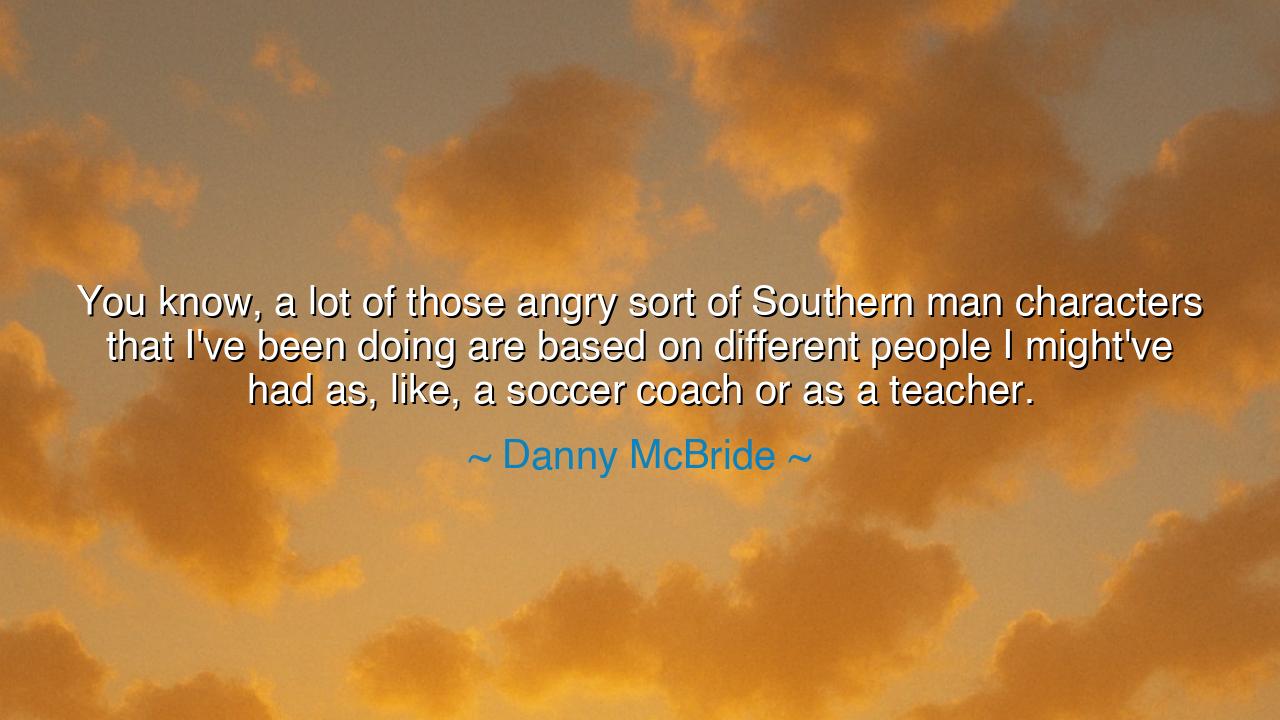
You know, a lot of those angry sort of Southern man characters
You know, a lot of those angry sort of Southern man characters that I've been doing are based on different people I might've had as, like, a soccer coach or as a teacher.






“You know, a lot of those angry sort of Southern man characters that I've been doing are based on different people I might've had as, like, a soccer coach or as a teacher.” Thus spoke Danny McBride, the actor and writer known for his fierce, comedic portrayals of flawed men, whose bluster often conceals fragility. In this saying lies a truth both humble and profound: that the characters who stride across stage and screen are not born from thin air, but from the living world around us. His words remind us that every human being we encounter—whether coach, teacher, or neighbor—may become part of the fabric of story, carried into memory and woven into art.
The meaning here rests in the transformative power of observation. McBride admits that his characters, with all their anger, bravado, and vulnerability, are rooted in the voices and gestures of real people from his youth. The soccer coach barking orders on the field, the teacher struggling to command respect in a rowdy classroom—these became archetypes in his mind, later transformed into exaggerated figures for the world’s entertainment. In this way, McBride shows us that the ordinary people of our lives are the soil from which extraordinary art may grow.
The origin of this insight lies in the ancient craft of storytelling itself. From the days of Homer, bards and poets drew their heroes and villains from the men and women they saw around them. The boastful warrior, the shrewd elder, the angry king—all of them were once echoes of familiar figures, amplified and reshaped. Shakespeare, too, looked upon his world and gave us Falstaff, Macbeth, and Lear, each bearing traits drawn from the rulers, soldiers, and fools of his time. McBride continues this lineage: he looks not to myth alone, but to the raw material of lived experience, turning it into stories that both amuse and reveal.
This practice is not only about entertainment—it is also about truth. For by portraying these angry Southern characters, McBride holds up a mirror to culture itself. Behind the comedy, one finds real questions: Why do men armor themselves with rage? Why do authority figures sometimes bluster more than they guide? By exaggerating the flaws of those he once saw in positions of influence, McBride exposes human weakness in a way that invites both laughter and reflection. Comedy, in this sense, is not merely escape but revelation.
History gives us many examples of this kind of transformation. The playwright Molière once mocked the hypocrisy of French society by turning pompous nobles and greedy doctors into characters of satire. His inspiration came directly from the people he knew, whose faults became timeless lessons when translated to the stage. Likewise, McBride reveals that even the stern rebukes of a childhood coach or the harsh words of a teacher may later become sources of wisdom, laughter, and understanding for countless others. What was once intimidation becomes art; what was once frustration becomes fuel for storytelling.
The lesson for us is twofold. First, we must understand that the people around us, in all their imperfections, are themselves teachers of a kind. Even the harsh and angry figures show us something about the human condition, if we are willing to observe with care. Second, we are reminded that our own struggles, even the unpleasant encounters of youth, can be transformed into something meaningful. Pain can be reshaped into humor, frustration into wisdom, memory into creativity.
Therefore, dear listener, take McBride’s words as a guide. Look upon your own life not only as experience to endure, but as a treasury of characters, lessons, and inspiration. The coach who shouted, the teacher who scolded, the friend who stumbled—these are not merely shadows of the past, but seeds of stories yet to be told. Cherish them, transform them, and let them become vessels of truth. For in the end, it is not only the artist who benefits, but all who hear the story, laughing and learning together, as humanity sees itself reflected once more.






AAdministratorAdministrator
Welcome, honored guests. Please leave a comment, we will respond soon